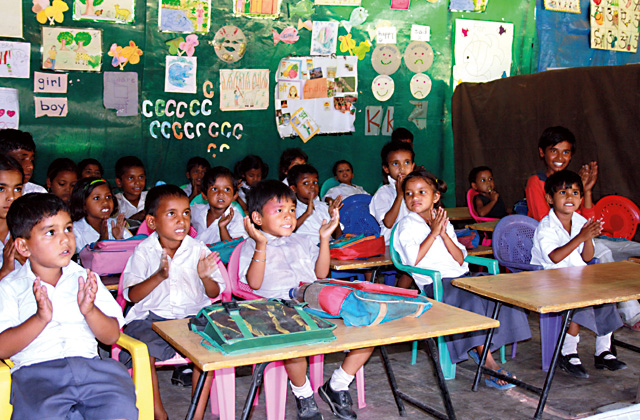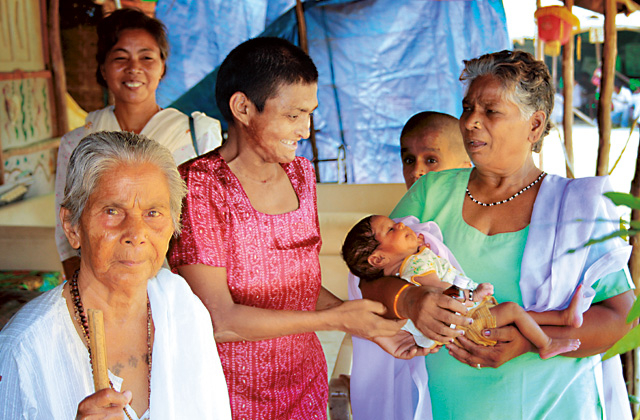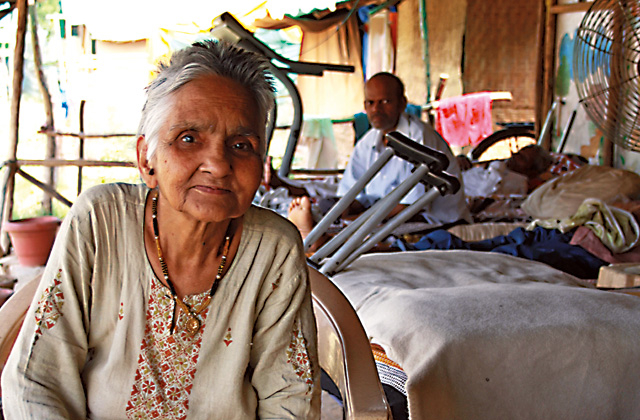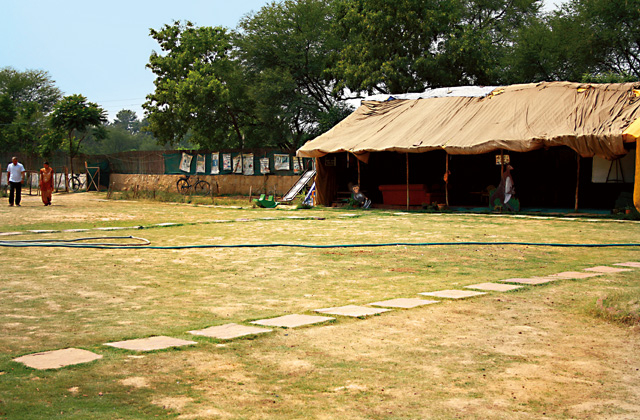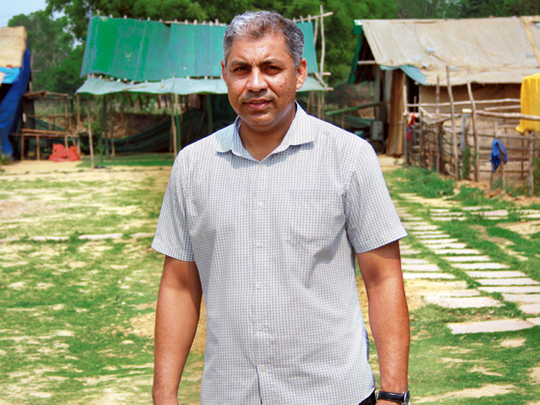
To Ravi Kalra, January 1 is not just New Year's day. It is ‘no honking day'. "It's a day I decided we have to set aside every year to educate people about the harmful effects of noise pollution,'' says New Delhi-based Kalra.
In many cities in India, including the capital Delhi, it is not uncommon to hear drivers using the car horn indiscriminately - something that has always been a matter of concern to environmental activists and peace lovers.
"I was getting fed up with the noise in the city,'' says Kalra, a passionate environmentalist and founder of Earth Saviours Foundation (ESF), an NGO (non-governmental organisation) that has among other initiatives a school for street children and an old-age home for the poor.
"In our country, especially Delhi, people honk even in the vicinity of hospitals, educational institutions and asylums. I wanted to stop this."
Keen to make the city quieter, Kalra and a group of like-minded individuals decided to take action against errant drivers. In 2009, he launched a drive called ‘no honking on express highways'. The first thing they did was to remove the ‘Horn Please' signs, a common sight on the rear of most commercial vehicles in India. The sign boards they could not remove they simply used black paint to cover up. "We must have removed or painted over around 10,000 signs,'' recalls Kalra.
Of course, the owners and drivers were not happy to see the activists defacing their vehicles. "I was beaten up several times along with my volunteers. Some people even lodged complaints against us with the police,'' he says.
Initially, the police failed to see Kalra's point of view, "but over time when we explained the importance of reducing noise in the city, they began supporting us," Kalra says.
However, the initiative did not have as powerful an impact as he had hoped. Determined not to rest until he made a difference, Kalra decided to coin a few anti-honking slogans that were both educational and powerful. He also declared January 1 as no-honking day and distributed thousands of bumper stickers with the message ‘Do Not Honk!'.
Another sticker carried a slogan in Hindi: ‘Kutta bhi bina wajah nahin bhonkta' (Even a dog does not bark without reason). "It did shame a few into reducing the use of the horn,'' he says.
This time he was lucky. The campaign caught the attention of national media and the civic authorities such as the New Delhi Municipal Council and Municipal Corporation of Delhi, which decided to back his cause. They put up ‘No Honking' boards in several parts of the city. "I was really happy the civic authorities had taken note of the initiative, and their move was definitely a good one,'' Kalra says.
Determined to work for the greater good
Belonging to a middle-class family, Kalra was born and brought up in Delhi. His father was an inspector with Delhi Police, so discipline and the importance of adhering to the law were lessons he was taught early in life.
After graduating from Delhi University, Kalra, a 4th Dan Black Belt in Taekwondo, founded the Indian Amateur Taekwondo Federation and offered training programmes to among others, Delhi Police personnel, embassy officials and staff of several corporate institutions and schools in the city. He also set up a business as a career consultant to those interested in taking up jobs overseas.
Although he was doing well in his career, he was passionate about doing something in the realm of social service. "I tried to set up an NGO several times, but was unsuccessful because of the differences that used to crop up among the board members,'' he says. "Differences of opinion would generally arise on how much we should charge children who join our school, or the elderly who stay at the old-age home we were planning to set up. But this was not my idea of an NGO. I mean, what is the point of being an NGO if we are charging people for whom the institution is being set up for?"
But Kalra did not lose heart. "I was sure I would be able to one day set up an NGO.'' The catalyst came in the form of a man named Chaudhry Sukhbir Singh. "He was a God-send,'' says Kalra. "He came to know about my passion to set up a school and an old-age home for the poor, and without any guarantor, agreed to lease a one-acre plot of land in the city to me on a monthly rent of Rs.65,000.''
It was on this plot of land at Vasant Kunj in New Delhi that Kalra established Earth Saviours Foundation (ESF) in 2008. Seeing his passion and unrelenting zeal to make a difference to society, a small group of dedicated social workers and volunteers, which included young boys and girls, rallied behind him offering their wholehearted support to his projects.
One of the first things he did after receiving the land was to construct makeshift shelters for the homeless, which also doubled as schools for street children during the day. He used all his savings for this.
Kalra was keen to get the children, who were often found begging on the streets, into his school. "But I realised that persuading the parents of such children was a gigantic task. Most of the parents were also beggars and were reluctant to put their children in any school. ‘People offer money to children easily which brings us food. If they do not beg, how will we live? What use is education if we don't get our food today?' they asked me when I approached them to send their children to school," he says.
Not one to give up, Kalra promised to provide jobs to the parents on condition that they would educate their children. Relying on a set of loyal friends, he was able to find placements for them as drivers, helpers, cooks and maids.
Starting with five children in 2008, the school, which has classes from nursery to Class 5, now has 125 children in the age group of three to 13 years, including some children who had never attended a school before.
Teachers form strong bond with children
"After the initial hiccups, children began coming to the school on their own. A lot of them are from nearby slums. We do not charge any fee from the children and also provide them educational material free of cost. The teachers - Maheshwari, Rakhi, Usha and Shilpa - are all volunteers but we pay a small stipend to them whenever possible.'' The teachers hold the initiative so close to their hearts and have developed such a strong bond with the children that none of them has dropped out of school for the past three years. The enthusiasm at the school is such that students do not like taking summer breaks. So the teachers conduct summer camps teaching them arts and crafts.
Kalra dreams of opening at least ten more schools, but those would have to be in properly constructed concrete buildings. "I would like to provide hostel accommodation and vocational education to the children free of cost.''
Funds have not been easy to come by. "I sold my office premises in the posh Safdarjung Enclave area, from where I conducted my businesses [as a career consultant]. But I was fortunate in that once the funds got exhausted, several caring people stepped forward offering donations and other help to continue with our initiatives,'' he says. "For instance, although at times I have not been able to pay him the rent, Singh has never complained, perhaps because he has seen the work we do for the poor.''
Providing shelter for the elderly
Apart from making a difference in the lives of more than 125 street children, the ESF also offers shelter to 30 elderly men and women who were either abandoned by their families or have been living on the streets all their lives.
Krishna Avtar is one such man. After the death of his wife, his brother and sister-in-law forced him out of the house. "They usurped my property and made me penniless. Unable to find work at my age, I had been living on the road for the last six months," he says. Kalra's volunteers found the man on the streets and took him into the ESF shelter.
The story of Sukhnandan, 69, is not so different. He came to live in the old-age home about nine months ago. His only son was unwilling to look after him "so I had nowhere to go'', he says. "A friend of mine suggested this NGO and I came here. My son, daughter-in-law and grandchildren come to meet me occasionally, but I have now reconciled to the idea of living here,'' he says.
Sukhnandan needs support to get up and walk. A former official with the Delhi Cloth Mill, he is today finding it difficult to become accustomed to life outside his home environs. A dejected man, he says in chaste English: "What can't be cured has to be endured."
Then there's Saroj, a mentally unstable single mother in her late 30s, who was also found by the volunteers begging in the Old Delhi area. According to the volunteers, she was forced to leave her hometown in Ranchi, Bihar (northern India) unable to bear the physical abuse of her brother who threatened to kill her because he believed she brought him ill luck. Saroj gave birth to a daughter in the shelter.
Sadhna, a 95-year-old woman who has three sons and nine grandchildren, is another resident. Belonging to a very well-off family, she fractured her hipbone after a fall. Back home from the hospital she was seen as a burden on the family and this resident of New Delhi soon found that she had nowhere to go, and ended up on the streets begging.
Her brother spotted her one day near his home and thinking that she would be an embarrassment to the family, put her in an auto-rickshaw and dropped her at the gates of the ESF. "I have never seen any of them since that day,'' she says, with a sigh.
Kalra makes an effort to take care of such people and find time to talk to them individually, often feeding them with his own hands. "Running the social service projects can sometimes drain the energies and financial resources,'' he says.
Apathy towards the environment is another issue that irks him. "The alarming level of pollution and callousness towards nature is making us more prone to natural disasters. Our carelessness and negligence towards the environment has resulted in two of our most important rivers, Ganga and Yamuna, becoming dirty and even toxic. It's a pity to find that some rivers have even gone dry.
"A spirit of caring and sharing is very important and needs to be encouraged for the betterment of our own lives and saving our lovely planet," Kalra says.
People interested in helping Kalra and his team of volunteers can contact Earth Saviours Foundation, 34 Green Avenue, Near ‘D' Block Church, Vasant Kunj, New Delhi - 110 070, India. Mobile: 91-9818171695
Making a difference
Who: Ravi Kalra
What: Earth Saviours Foundation, an organisation that runs a school for street children and an old-age home for the poor and the abandoned
Where: New Delhi, India


